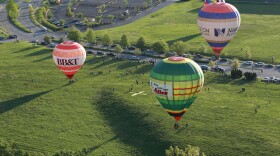Weather can have a major impact on outdoor sports – and not just for the fans in the stands. Throwing a football, hitting a baseball or trying to kick a soccer ball can be very different on a cold and wet day compared to a warm, sunny day. On the latest edition of “Science Behind the Forecast” with WAVE 3 meteorologist Tawana Andrew, we examined the effects weather can have on a soccer match. Andrew talked about what can happen to a soccer ball on a warmer day.
"If you think about it, warmer air is lighter than cold air and on warmer days what happens is that a soccer ball may actually travel further because of reduced drag compared to a chilly day," she said.
For player safety, soccer referees will use a wet bulb thermometer to get a more accurate reading on the temperature. Andrew explained what that thermometer can do.
"It measures what's called the wet bulb globe temperature which is something that you don't often hear about,” she said. “It is a measure of the heat stress that your body takes on in direct sunlight and it also takes into account the temperature, humidity, the wind speed, the sun angle and even the amount of clouds overhead."
Listen to the entire episode of “Science Behind the Forecast” with WAVE 3 meteorologist Tawana Andrew in the media player below.
89.3 WFPL News Louisville · Science Behind the Forecast: How weather impacts outdoor soccer matches






